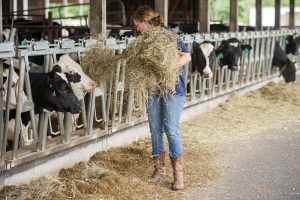Canada Sponsorship
Get Hired In Canada With Free Visa Sponsorship – Barn Worker
By

Job Category: Get Hired In Canada With Free Visa Sponsorship
Job Title: Barn Worker
Location: Clark Egg Farms in Caledonia, ON
Shift: Morning, Night, Overnight
Wage: $20.00 per hour
Clark Egg Farms is seeking a dedicated, career-minded person to work on our Egg Farm in Caledonia. Farming is a way of life, and we are looking for a person who shares our passion for farming.
Must have flexible availability, including weekends and holidays.
Follow and maintain bio-security standards.
Benefits included.
We thank all applicants for their interest, however, only those candidates selected for an interview will be contacted.
Benefits:
- Dental care
- Extended health care
- RRSP match
- Vision care
Ability to commute/relocate:
- Caledonia, ON: reliably commute or plan to relocate before starting work (required)
Application question(s):
- Do you live in the area
- Do you own any birds or water fowl (bio-security reasons)
Work Location: In person
What does the job Farm Worker involve?
A farm worker is typically responsible for various tasks related to agricultural activities and the maintenance of a farm. The specific duties can vary depending on the type of farm, crops, or livestock involved. Here are some common responsibilities associated with the job of a farm worker:
Crop Cultivation:
- Planting, cultivating, and harvesting crops.
- Operating and maintaining farm machinery such as tractors, plows, and harvesters.
- Irrigating fields and monitoring water levels.
Livestock Care:
- Feeding and caring for animals, including cattle, poultry, pigs, or other livestock.
- Monitoring the health and well-being of animals.
- Assisting with breeding and birthing processes.
Maintenance Tasks:
- Repairing and maintaining farm structures, fences, and equipment.
- Cleaning and organizing farm facilities.
- Operating and maintaining irrigation systems.
Pesticide and Fertilizer Application:
- Applying pesticides, herbicides, and fertilizers as needed.
- Following safety protocols for handling chemicals.
Harvesting:
- Harvesting fruits, vegetables, or other crops at the appropriate time.
- Sorting and packing harvested produce for transport.
General Labor:
- Performing various manual tasks, such as lifting, carrying, and loading/unloading materials.
- Assisting with tasks as directed by the farm manager or supervisor.
Record Keeping:
- Keeping records of planting and harvesting dates.
- Recording information related to livestock health and production.
Weather Monitoring:
- Monitoring weather conditions and taking appropriate actions to protect crops or livestock.
Team Collaboration:
- Collaborating with other farm workers and supervisors to accomplish tasks efficiently.
- Communicating effectively with team members.
Farm workers may work in various weather conditions and seasons, and the nature of the job requires physical strength, stamina, and the ability to adapt to different tasks. The specific duties can also be influenced by the scale and type of farming operations, as well as technological advancements in agriculture.
What are the main requirements for Farm Worker job?
The specific requirements for a farm worker job can vary depending on the type of farm and the tasks involved. However, there are some common qualifications and characteristics that are often sought in candidates for farm worker positions. These may include:
- Physical Fitness: Farm work can be physically demanding, involving lifting, bending, and long periods of standing. Candidates should be in good physical condition to handle the strenuous aspects of the job.
- Experience: While not always required, prior experience in farming or related work can be an asset. Familiarity with farm equipment, livestock handling, and basic agricultural practices can make a candidate more competitive.
- Basic Agricultural Knowledge: A fundamental understanding of farming practices, crop cycles, and livestock care is beneficial. This knowledge can be gained through education, training programs, or hands-on experience.
- Mechanical Skills: Many farm tasks involve the operation and maintenance of machinery such as tractors, plows, and harvesters. Candidates with mechanical aptitude and the ability to operate and troubleshoot farm equipment are often preferred.
- Reliability: Farm work often follows seasonal and weather-dependent schedules. Employers value candidates who are punctual, dependable, and able to work flexible hours as needed.
- Adaptability: Farm workers may need to adapt to changing weather conditions, tasks, and priorities. The ability to handle unexpected challenges and changes is crucial in this role.
- Teamwork and Communication: Working on a farm often involves collaboration with other team members. Strong communication skills and the ability to work well with others are important.
- Attention to Detail: Whether planting crops, caring for livestock, or harvesting, attention to detail is essential for ensuring tasks are performed accurately and efficiently.
- Basic Education: While not always a strict requirement, a high school diploma or equivalent education may be preferred by some employers. Basic literacy and numeracy skills are important for record-keeping and following instructions.
- Safety Awareness: Farm work involves potential hazards, especially when operating machinery or handling chemicals. A commitment to safety practices and the ability to follow safety protocols are crucial.
It’s important to note that specific requirements can vary between different farms and regions. Some employers may provide on-the-job training, especially for entry-level positions. Individuals interested in farm worker jobs can enhance their prospects by gaining relevant experience, acquiring basic agricultural knowledge, and demonstrating a strong work ethic.
Who can apply to this job?
The employer accepts applications from:
- Canadian citizens and permanent or temporary residents of Canada.
- Other candidates with or without a valid Canadian work permit.
How to apply
Online: Apply On Company WebSite
How Do I Get Visa Sponsorship As A Foreigner
Getting visa sponsorship as a foreigner typically involves finding an employer, educational institution, or other authorized entity in the country you wish to visit or move to who is willing to sponsor your visa application. Here’s a general guide on how you can go about getting visa sponsorship:
- Identify Potential Sponsors: Research companies, educational institutions, or organizations in your desired destination country that are eligible and willing to sponsor foreign workers, students, or individuals for visas. Look for job openings, educational programs, or internship opportunities that offer visa sponsorship.
- Apply for Jobs or Educational Programs: Apply for jobs or educational programs that offer visa sponsorship. Tailor your applications to highlight your qualifications, skills, and experiences that make you a strong candidate for sponsorship.
- Network: Utilize professional networking platforms, attend industry events, and connect with individuals who may be able to help you find visa sponsorship opportunities. Networking can often uncover hidden job openings or sponsorship possibilities.
- Research Visa Requirements: Familiarize yourself with the specific visa requirements and procedures for the country you wish to visit or move to. Each country has its own rules and regulations regarding visa sponsorship, so it’s essential to understand what is required.
- Communicate Your Need for Sponsorship: When applying for jobs or educational programs, clearly communicate your need for visa sponsorship. Highlight your willingness to undergo any necessary visa application processes and assure potential sponsors of your commitment to complying with immigration laws.
- Attend Interviews: If you are selected for interviews, be prepared to discuss your visa status and willingness to obtain sponsorship. Be honest and transparent about your intentions and demonstrate your qualifications and suitability for the position or program.
- Negotiate Terms: If you receive a job offer or acceptance into an educational program that offers visa sponsorship, carefully review the terms of sponsorship, including any contractual obligations or financial responsibilities. If necessary, negotiate terms that are acceptable to both parties.
- Follow Visa Application Procedures: Once you have secured sponsorship, follow the visa application procedures outlined by the sponsoring organization or institution. Provide all necessary documentation and information accurately and promptly to facilitate the visa application process.
- Prepare for Relocation: If your visa application is approved, prepare for relocation to the destination country. Make arrangements for housing, transportation, and other logistics to ensure a smooth transition.
- Comply with Visa Regulations: After arriving in the destination country, ensure that you comply with all visa regulations and requirements. Maintain valid visa status and fulfill any obligations or conditions associated with your visa sponsorship.
Remember that securing visa sponsorship can be a competitive process, so persistence, patience, and proactive networking can increase your chances of success.
🔥Latest Job Vacancies in Canada (Updated Daily)
🇨🇦 Visa Sponsorship Jobs in Canada – Caregiver
Apply Now🇨🇦 Factory Jobs in Canada with Sponsorship – Ontario
Apply Now🇨🇦 Construction Jobs in Canada with Sponsorship – Edmonton, AB
Apply Now











